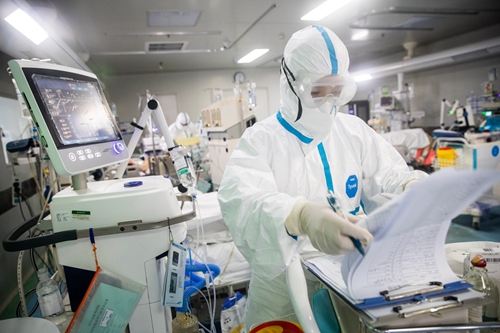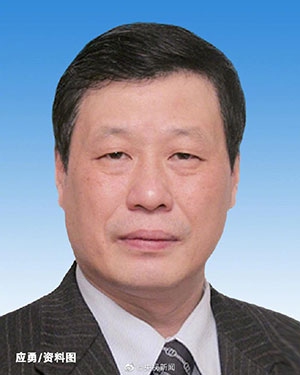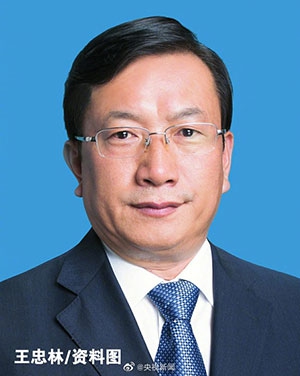HOME >> CHINA,SPECIAL-COVERAGE
China reshuffles top officials in coronavirus epicenter Hubei Province
By Chen Qingqing and Zhao Yusha Source:Global Times Published: 2020/2/13 12:37:32
Authorities to use virus battle to assess officials’ performance

A doctor wearing protective clothing works in a hospital in Wuhan, Central China’s Hubei Province. Photo: cnsphotos
China has reshuffled top officials in Central China's Hubei Province, the epicenter of the novel coronavirus pneumonia (COVID-19) outbreak, by appointing a new Party chief to both the province and the capital city Wuhan, with both having a background in legal affairs for years and considered “firefighters,” and decisive in dealing with public health crises.
Ying Yong was appointed secretary of the Hubei Provincial Committee of the Communist Party of China (CPC), replacing Jiang Chaoliang, according to a decision announced by the CPC Central Committee on Thursday.
Also, Wang Zhonglin, a member of the Standing Committee of the CPC Shandong Provincial Committee and concurrently Party chief of Shandong’s provincial capital city Ji’nan, was named Wuhan's new Party chief, replacing Ma Guoqiang.
The official announcement of the reshuffle came after problems in Hubei and Wuhan were exposed in the epidemic prevention and control work amid the COVID-19 outbreak.
Since the outbreak, the central government sent an inspection group to guide the epidemic control work in Hubei, and a number of local officials have been questioned and punished for failing to fulfill their duties.
The new officials have working experience in legal affairs, and are considered problem-solvers who can make accurate decisions. Their appointments to the major battlegrounds amid the outbreak also reflects the central government’s determination to win the battle while letting competent “firefighters” handle the challenges, analysts said.
Similarly, the central government also removed some top officials from their posts amid the SARS outbreak between 2002 to 2003. From the first confirmed case reported on December 15, 2002 in South China’s Guangdong Province to an official announcement of the sacking of two ministerial-level officials former health minister Zhang Wenkang and former mayor of Beijing Meng Xuenong -- on April 20, 2003, it took four months to reshuffle high-level officials amid the public health crisis.
Since the first COVID-19 case was reported on December 8, 2019, a handful of senior officials in Hubei have been removed or punished for their poor handling of the crisis. This time, it took only two months to see a major reshuffle of top officials in the coronavirus epicenter Hubei.
Faced with the sudden COVID-19 outbreak, problems such as sloppiness and poor management of work have been exposed among Wuhan and Hubei authorities, reflecting severe loopholes in local governance. The appointment of those new officials will also enhance prevention and control measures against the outbreak, analysts said.

Ying Yong
Competent candidates
Ying was born in November 1957 in Xianju, East China’s Zhejiang Province. His’s previous work experience focused largely on public security, political and legal affairs. He has been working in Shanghai since 2007 when he became an official in the Shanghai High People’s Court.
In his effort to combat the virus in Shanghai, Ying, also head of Shanghai’s leading group for virus containment, emphasized basic level units’ strength in fighting the battle. He also conducted detailed and thorough discussions with people working in residential communities, hearing their opinions on the containment work.
He also stressed the role science plays in this battle. Ying suggested Shanghai use its edge as a “scientific highland” to support the prevention and control of the virus. Speaking at a conference on Tuesday, Ying suggested scientific achievements should race against time, against the virus, to gain the initiative in fighting the coronavirus.
Ying received on-the-job college education and a master's degree in law and the title of national grade-two grand justice, according to an online resume.
A Shanghai-based expert, speaking on condition of anonymity, praised Shanghai’s virus containment work. He told the Global Times that Shanghai, home to millions of migrant workers, could have become the next epidemic center for the coronavirus.
However, with effective and scientific measures which do not disturb people’s normal lives, Shanghai has managed to keep the infection at a moderate level compared to other provinces and municipalities. As of Wednesday midnight, the city reported only 311 confirmed cases of the COVID-19 infection.
The expert attributed this to Shanghai top-level officials’ “modest nervousness,” which means they did not panic when faced with the virus outbreak, but also made urgent and scientific decisions based on data and professional knowledge of the epidemic.
Ying kept a clear mind at the early stage of the outbreak, said the expert, noting that Ying is also an official willing to take advice.
In early February, Ying held a symposium in which he invited officials who fought the SARS outbreak in Shanghai, in order to draw from their experience in fighting the new battle against the novel coronavirus, local media reported.
Ying was also reported as saying in late January after the virus broke out that “a non-sloppy government is one brave enough to face supervision; a government eager to make progress is one willing to accept criticism,” to inspire residents to give advice on virus containment.

Wang Zhonglin
Like Ying, Wang has also been working on the frontline in fighting the deadly virus in the past few weeks.
Born in 1962, Wang spent most of his career as a civil servant in East China’s Shandong Province. After graduating from the department of criminal law in East China’s University of Political Science and Law in the early 1980s, he worked at the public security bureau in Zaozhuang, a city located about a two-hour drive from Ji’nan.
Wang was appointed Party chief and director of the Shandong Development and Reform Commission in 2015 before becoming a member of the Standing Committee of CPC Shandong Provincial Committee and Party chief of Ji’nan in 2018.
“He is very energetic, decisive and highly motivated, and usually responds to questions very quickly,” a former official close to the Shandong government told the Global Times. At such a crucial moment in fighting the disease, the appointment aims to allow the official to use his experience in dealing with problems.
In the fight against the outbreak in Shandong, Wang also served as the general commander in giving instructions for the prevention and control work in Ji’nan, and showed up at different public places, including markets, residential areas, and railway stations without telling local officials in advance, according to media reports.
He also required no one to accompany him and no briefing in the office, but made field inspections to guide prevention and control work.
Shandong’s efforts to strengthen the prevention and control work while also ensuring agricultural production and export-driven businesses have been highly praised by the public as it set an example for provincial-level governance and crisis management capability amid the outbreak, analysts said.
During the outbreak, Shandong also donated a large amount of food, vegetables, fruits and medical supplies to Hubei, which some netizens saw as a way of “moving home” to support the most severely coronavirus-hit area.
On Monday, a medical team composed of 129 medical personnel from Shandong was dispatched to support Wuhan and Huanggang, another city hit by the outbreak, and 2,500 tons of fruits and vegetables have been donated to the region, media reports said.
Key battleground
Chinese President Xi Jinping, also general secretary of the Communist Party of China Central Committee, said the situation at the moment remains very serious, and Hubei and Wuhan are the top priority for epidemic prevention and control, the Xinhua News Agency reported.
The top authority also highlighted fighting the disease on the frontline is also a major way of assessing the performance of Chinese officials amid the outbreak, and those who fail to fulfill their duties would be held accountable.
Since the outbreak, more than 100 officials in Hubei have been held accountable for their incompetence in dealing with the prevention and control work, media reported.
“Someone in the local leadership must take responsibility for the current situation in Hubei,” a resident in Wuhan surnamed Huang, who has been closely observing the outbreak in the city, told the Global Times.
Most recently, Zhang Jin, Party chief of the Hubei Provincial Health Commission, and Liu Yingzi, director of the committee, were both removed from office, China Central Television reported on Tuesday.
Also, on Tuesday, central government officials summoned those from Wuhan for talks, following the latest incident in which local officials failed to fulfill their duties when transferring a batch of coronavirus patients to a designated hospital.
Posted in: POLITICS,FOCUS